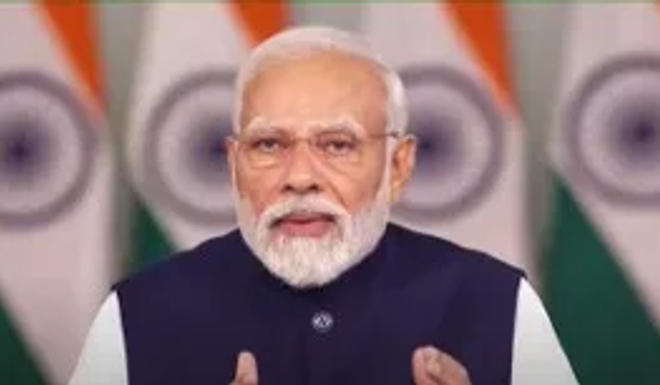Published 07:14 IST, November 23rd 2023
PM Modi: Have to ensure Israel-Hamas war doesn't escalate to regional conflict
Prime Minister Narendra Modi on Wednesday said the leaders of G20 countries have asserted that there was 'zero tolerance' for terrorism in West Asia with many nations calling for the two-state solution to the ongoing Israel-Palestine conflict.

Prime Minister Narendra Modi on Wednesday said the leaders of G20 countries have asserted that there was 'zero tolerance' for terrorism in West Asia with many nations calling for the two-state solution to the ongoing Israel-Palestine conflict.
Addressing a virtual G20 meeting, Modi said it has to be ensured that the ongoing Israel-Hamas war does not take the shape of a regional conflict, a view backed by all G20 leaders with the focus not allowing the violence to "spillover to beyond where it is." The G20 meeting was attended by Brazilian President Luiz Inacio Lula da Silva, UAE President Mohamed bin Zayed Al Nahyan, Russian President Vladimir Putin, Canadian Prime Minister Justin Trudeau, Bangladeshi Prime Minister Sheikh Hasina, UN Secretary-General Antonio Guterres, European Commission President Ursula von der Leyen, and IMF Managing Director Kristalina Georgieva, among others.
"I can't say there was a consensus on the two-state solution. This whole idea spillover … honestly, I would say the focus is right now on ensuring that it doesn't even spillover to beyond where it is," External Affairs Minister S Jaishankar told reporters at a media briefing on the summit.
At the outset, the Prime Minister made it clear that terrorism was "unacceptable" to everyone and that the death of civilians, anywhere, was condemnable.
The prime minister also welcomed news of the "humanitarian pause" and the announcement of the release of hostages and expressed the hope that they will be set free soon.
"It is necessary to ensure timely and continuous delivery of humanitarian aid. It is also necessary to ensure that the war between Israel and Hamas does not escalate into a regional conflict," Modi said.
Summing up the over three-and-a-half hour deliberations, Modi pitched for a two-state solution to end the festering Israel-Palestine dispute and said it is necessary to restore regional peace and stability.
After hearing the views of all G20 leaders, Modi said there is an agreement among them on a host of issues in relation to the serious situation in West Asia and listed the points of consensus.
"Diplomacy and dialogue are the only means to defuse territorial-political tensions," he said, referring to one of the seven points of agreement among the leaders.
In his opening remarks, Modi recalled that while assuming the G20 Presidency from Indonesian President Joko Widodo last year, he had said India would make the G20 inclusive, ambitious, action-oriented and decisive.
"In one year, we have together achieved this," the prime minister said.
Later, briefing reporters, Jaishankar said: "There was one point which all of us would have noted today -- a very clear recognition that India's G20 Presidency was Global South-centric and it had brought development back to the fair, square and centre of the G20." Jaishankar said that all 21 members, including the African Union, nine guest countries and 11 international organisations participated.
Asked about the absence of Chinese President Xi Jinping, Jaishankar said it was up to the member countries to decide who represented them at the meeting.
"Prime Minister Li Qiang had represented them at the Delhi Summit and they continued with that," the minister said.
Addressing the G20 leaders, Modi said, "In this world full of mistrust and challenges, it is this trust that binds us together. In the last one year, we have expressed confidence in 'One Earth, One Family and One Future'. Moving away from controversies, we have worked with unity and cooperation." "I can never forget that moment when in Delhi all of us welcomed the African Union into the G20. This message of inclusivity given by the G20 to the world is unprecedented.
"It is a matter of pride for India that under its presidency, Africa was given a voice. In the last one year in the G20, Global South's voice has also been heard," Modi said.
The prime minister asserted that the G20 has increased the confidence in multilateralism and global governance reforms have been given a direction.
The prime minister also invited leaders of G20 nations and that of the Global South to study the Aspirational Districts Programme of India, which aims at implementing sustainable development goals at the local level in the country.
"This single initiative has changed the lives of 25 crore people in the country," Modi said.
With Brazil set to take over the elite global body's presidency next month, he conveyed his best wishes to Lula and hoped the group would work unitedly with the spirit of "Vasudhaiva Kutumbakam" for global peace, stability and prosperity.
"It will continue to work to meet the expectations of the Global South," he said.
Transparent steps will be taken for debt restructuring, Modi said in reference to its likely agenda under Brazil's presidency.
Expressing confidence that food and health security besides sustainable development will be given priority, he called for ensuring a just, easy, and affordable climate finance along with climate action.
The prime minister also stressed on women-led development, pathways for "skilled migration" and the development of medium and small-scale industries.
Updated 07:14 IST, November 23rd 2023


